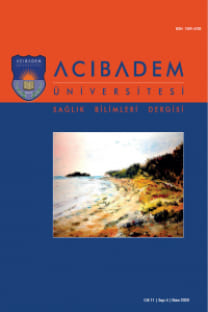Kanserli hastalarda radyoterapi sırasında hastaya özel beslenme desteği ve hemşire takibi yapılmasının kilo kaybı üzerine etkisi
The effect of individual nutritional support and nurse follow-up on weight loss during radiotherapy in cancer patients
radiotherapy, cancer, nutrition,
___
- 1. Laviano A, Meguid MM., Nutritional issues in cancer management. Nutrition. 1996; 12: 358-71. [CrossRef]
- 2. Bozzetti F. Nutrition support in patients with cancer. In: Payne-James J, Grimble G, Silk D, editors. Artificial Nutrition Support in Clinical Practice. 2nd ed. London; 2001;639-80.
- 3. Bozzetti F, Mariani L, Lo Vullo S, Group SW, Amerio ML, Biffi R, et al: The nutritional risk in oncology: a study of 1,453 cancer outpatients. Support Care Cancer 2012;20:1919-28. [CrossRef]
- 4. Dewey A, Baughan C, Dean TP, Higgins B, Johnson I. Eicosapentaenoicacid (EPA, an omega-3 fatty acid from fish oils) for the treatment of cancer cachexia. Cochrane Database Syst Rev. 2007; CD004597. [CrossRef]
- 5. Correia MI, Waitzberg DL. The impact of malnutrition on morbidity, mortality, length of hospital stay and costs evaluated through a multivariate model analysis. Clin Nutr. 2003; 22: 235-9. [CrossRef]
- 6. Naber TH, Schermer T, de Bree A, Nusteling K, Eggink L, Kruimel JW, et al. Prevalence of malnutrition in nonsurgical hospitalized patients and its association with disease complications. Am J Clin Nutr. 1997;66: 1232-9. [CrossRef]
- 7. Schattner M, Shike M. Nutrition support of the patient with cancer. In: Shils ME, et al., editors. Modern nutrition in health and disease. 10th ed. Philadelphia: Lippincott Williams & Wilkins; 2005. p. 1290-313.
- 8. Fearon K, Strasser F, Anker SD, Bosaeus I, Bruera E, Fainsinger RL, et al. Definition and classification of cancer cachexia: an international consensus. Lancet Oncol. 2011;12: 489–95. [CrossRef]
- 9. Baracos VE, Martin L, Korc M, Guttridge DC, Fearon KCH. Cancerassociated cachexia. Nat Rev Dis Prim. 2018;4: 17105. [CrossRef]
- 10. De Van Der Schueren MAE, et al. Systematic review and meta- analysis of the evidence for oral nutritional intervention on nutritional and clinical outcomes during chemo(radio)therapy: current evidence and guidance for design of future trials. Ann Oncol. 2018;29:1141– 53. [CrossRef]
- 11. Isenring EA, Capra S, Bauer JD. Nutrition intervention is beneficial in oncology outpatients receiving radiotherapy to the gastrointestinal or head and neck area. Br J Cancer. 2004;91:447-52. [CrossRef]
- 12. Ravasco P, Monteiro-Grillo I, Vidal PM, Camilo ME. Dietary counseling improves patient outcomes: a prospective, randomised, controlled trial in colorectal cancer patients undergoing radiotherapy. J Clin Oncol. 2005;23:1431-8. [CrossRef]
- 13. Paccagnella A, Morello M, Da Mosto MC, Baruffi C, Marcon ML, Gava A, et al. Early nutritional intervention improves treatment tolerance and outcomes in head and neck cancer patients undergoing concurrent chemoradiotherapy. Support Care Cancer; 2010:18;837- 45. [CrossRef]
- 14. Isenring E, Capra S, Bauer J. Patient satisfaction is rated higher by radiation oncology outpatients receiving nutrition intervention compared with usual care. J Hum Nutr Diet. 2004; 17:145–52. [CrossRef]
- 15. Langius JA, Bakker S, Rietveld DH, Kruizenga HM, Langendijk JA, Weijs PJ, et al. Critical weight loss is a major prognostic indicator for disease-specific survival in patients with head and neck cancer receiving radiotherapy. Br J Cancer. 2013; 109: 1093–9. [CrossRef]
- 16. Stratton R, Elia M. A critical, systematic analysis of the use of oral nutrition supplements in the community. Clin Nutr. 1999; 18: 29–84.
- 17. Evans WK, Nixon DW, Daly JM, Ellenberg SS, Gardner L, Wolfe E, et al. A randomized study of oral nutritional support versus ad lib nutritional intake during chemotherapy for advanced colorectal and non-small-cell lung cancer. J Clin Oncol. 1987; 5: 113-24. [CrossRef]
- 18. Ovesen L, Allingstrup L, Hannibal J, Mortensen EL, Hansen OP. Effect of dietary counseling on food intake, body weight, response rate, survival, and quality of life in cancer patients undergoing chemotherapy: a prospective, randomized study. J Clin Oncol. 1993;11: 2043-9. [CrossRef]
- 19. Baldwin C, Parsons T, Logan S. Dietary advice for illness-related malnutrition in adults. In: The Cochrane Library issue 2. Oxford; 2004. Update Software.
- 20. Capra S, Bauer J, Davidson W, Ash S. Nutritional therapy for cancerinduced weight loss. Nutr Clin Pract. 2002; 17: 210-3. [CrossRef]
- 21. The American Dietetic Association and Morrison Health Care. Medical Nutrition Therapy Across the Continuum of Care. 2nd ed. Chicago, IL: American Dietetic Association; 1998.
- 22. Isenring EA, Bauer JD, Capra S. Nutrition Support Using the American Dietetic Association Medical Nutrition Therapy Protocol for Radiation Oncology Patients Improves Dietary Intake Compared with Standard Practice. J Am Diet Assoc. 2007; 107:404–12. [CrossRef]
- ISSN: 1309-470X
- Yayın Aralığı: 4
- Başlangıç: 2010
- Yayıncı: ACIBADEM MEHMET ALİ AYDINLAR ÜNİVERSİTESİ
Antiviral Kullanımına Bağlı Gelişen Femoral Nöropati: Olgu Sunumu
Burcu ÖNDER, Fatih Oğuz ÖNDER, Betül YAVUZ KELEŞ
İlköğretim Çağındaki Çocukların Okul Çantası Ağırlıkları Sırt Ağrısını Etkiler mi?
Nilgün KURU ALICI, Oya Nuran EMİROĞLU
Akut Pulmoner Embolide Uzun Dönem Mortalite ile Tam Kan Sayımı Parametrelerinin İlişkisi Var mıdır?
Fatma TOKGÖZ AKYIL, Gökhan SÖĞÜT, Murat Erdal OZANTÜRK, Ahmet TOPBAŞ, Hasan TÜTÜNCÜLER, Mustafa AKYIL, Tülin SEVİM
Emin ÇAKMAKÇI, Kosti Can ÇALIŞKAN
İdrar Tüplerindeki Katkı Maddelerinin Biyokimyasal Analitlere Etkisi
Arzu KÖSEM, Sevilay SEZER, Canan TOPÇUOĞLU, Turan TURHAN
Öğretmenlerin Sigara İçme Konusunda Tutum ve Düşüncelerinin Değerlendirilmesi: Kesitsel Bir Çalışma
